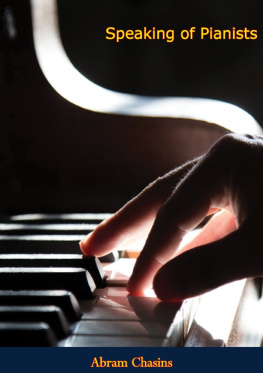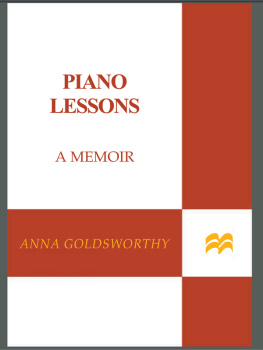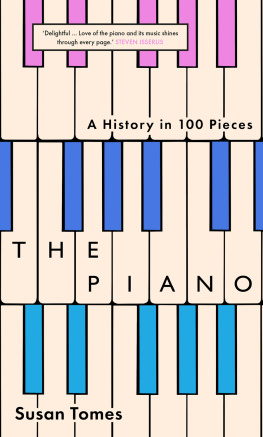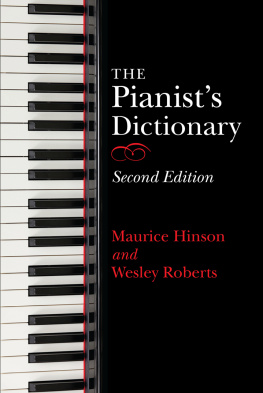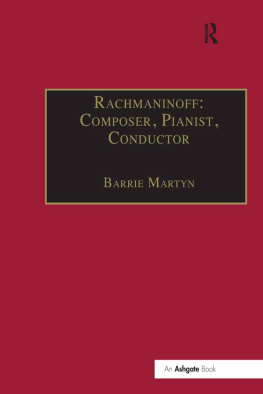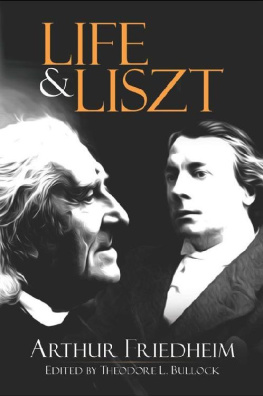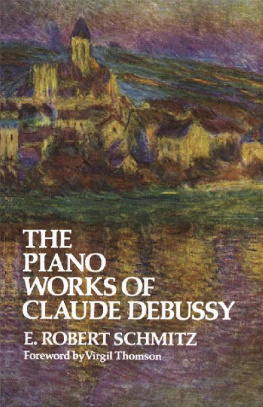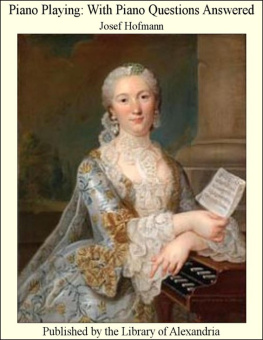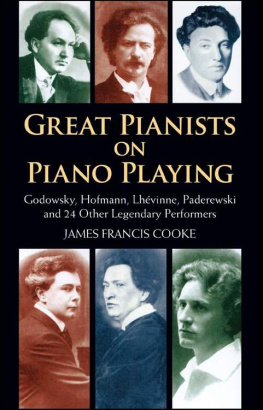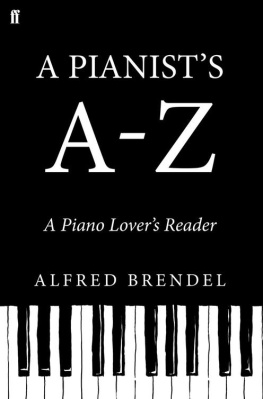

Burtyrki Books 2020, all rights reserved. No part of this publication may be reproduced, stored in a retrieval system or transmitted by any means, electrical, mechanical or otherwise without the written permission of the copyright holder.
Publishers Note
Although in most cases we have retained the Authors original spelling and grammar to authentically reproduce the work of the Author and the original intent of such material, some additional notes and clarifications have been added for the modern readers benefit.
We have also made every effort to include all maps and illustrations of the original edition the limitations of formatting do not allow of including larger maps, we will upload as many of these maps as possible.
SPEAKING OF PIANISTS...
BY
ABRAM CHASINS
TABLE OF CONTENTS
Contents
Dedication
To my teachers and my pupils,
WHO MADE ME AWAKE OF EVERYTHING I HOLD MOST DEAR
Acknowledgments
FIRST, my profound though not unmixed thanks go to Irving Kolodin of the Saturday Review , whose encouraging editorial invitations plunged me into the swirling waters of criticism. I am indebted to that magazine for permission to draw upon material first published in its pages; to Columbia Records and RCA Victor for similar generosity; and to Elliott M. Sanger of WQXR for his kindly patience with a music director who would write a book.
To Dore Smedley I am grateful for arming me with the sober facts of a book-writers life, and for showing me trade tricks with manila envelopes, scissors, and paste; to Thomas Lask of The New York Times and to Wills Hollingsworth of WQXR for their unflinching hospitality whenever I charged their desks with questions regarding what may humorously be called my syntax; to Miriam Molin for painstaking preparation of the Index; to Paul Hirschman for proffering helpful advice and for reading proofs; and to my editor, Herbert Weinstock, whose adamant demands somehow always managed to sound like friendly, casual suggestions.
My deepest thanks I owe to my wife, whose forbearance and helpfulness prevailed throughout writing periods that often uprooted her professional and personal life.
ABRAM CHASINS
SPEAKING OF PIANISTS...
Introduction
IN THIS BOOK I have set down a variety of recollections and impressions related to a part of my pianistic life, that part which I lived as a student, listener, and observer rather than as a concert pianist. I invite the reader to share with me some of the experiences, some of the sounds and ideas gathered during fifty years of association with the piano, much of its literature, and many of its players.
I do not promise that other matters will not creep into these pages. The piano is a rich subject for illustrating many elements of music, even of life itself, and I have often been unable to resist its suggestiveness. Yet, essentially, this is a series of reminiscences relevant to piano-playing and piano musicreactions stimulated by personal associations by performances on and off the platform, and by recordings.
Although the history of music exists in composition, the life of music exists in performance, actual or recorded, constructed as in score-reading, or reconstructed in the mind. From time to time I shall pause to comment on things heard and heard about, on past and present ideals and practices, on things I love and loathe. The reader and I may not always agree. Happily, that is our aesthetic as well as our democratic right. Should this book prove at all provocative to those whose lives are enriched by music, it will modify some of the misgivings I hold about my ability to put into words anything so intangible and intricate as musical reaction, not to mention the electrifying fusion of genius and knowledge.
My own taste and opinions stem from standards and principles learned from artists I had the privilege of calling master and friend. They, who personified artistic standards so convincingly, should actually have written this book. Of course, in many ways they havea good deal of it. But perhaps they would have needed another lifetime to formulate and set down what it took each of them one lifetime to achieve.
It was they who persuaded me and substantiated in their art that the laws of beauty have an inexorable logic. Their precepts and practices are the main sources of my feeling about the piano and its literature, inescapably woven into the texture and fabric of my entire musical outlook.
In the hope that the reader will care to come along with me and to hear for himself some of the things I heard, I should like to begin by having him meet Josef Hofmann.
Exposition
Josef Hofmann
IT WAS an abnormally hot afternoon in the spring of 1926 when I found myself at the door of Josef Hofmanns suite at the Great Northern Hotel in Manhattan. I waited for quite a few minutes before knocking, hoping that my heart would stop pounding. Hofmann had been my pianistic idol for many of my twenty-two years, but I had never come closer to him than tie distance between the top balcony and the stage of Carnegie Hall.
And here I was, paying him a visit at his invitation. It had all come about two weeks before, when I had met Mrs. Hofmann and had been astonished to hear her say: Josefs been told about your Chinese pieces. Hed like to hear them and anything else youd like to play for him. Were coming in from Philadelphia for a few days before we sail for Europe. Well be at the Great Northern. Will you come?
Would I?
My first jolt that afternoon came when Hofmann himself answered my knock and Iall five-foot-six of mehad to lower my gaze several inches to meet his squarely. The contrast between the mild-mannered little man who greeted me and the mental image I had held of him was startling. It was hard to reconcile the soft voice, delicate features, small hands, and meticulously debonair dress with the relentless Titan of the keyboard. The only physical sign of his power was in his massive back and shoulders. He looked like a chunky quarterback who moved with the litheness of a dancer.
At that time Hofmann had just turned fifty, but looked ageless. He could just as well have been forty or sixty. While we talked I observed the impeccable neatness of the man and the orderliness of his simple hotel parlor. An immaculately dusted Steinway grand stood in the corner, its keys gleaming, but with not a single piece of music on itjust a lone and shining metronome. Hofmann asked me about my piano studies, theoretical training, and compositional work. His questions were pointed and precise. He never wasted a syllable. He spoke flawless English with a slight accent, origin untraceable. I later learned that he was equally at home in German, French, and, naturally, his native Polish.
In the first few minutes of conversation he revealed a rigidly disciplined mind, an intense concentration, and a fierce passion for separating opinion from fact, truth from half-truth. He also had a quick sense of humor. Finally, gesturing with an economical wave toward the piano, he said: Please.
First I played my Three Chinese Pieces .
Very effective. Ill play them, he said.
Then I played Chopins F sharp minor Nocturne.
Ahem, he said, and now?
A group of Chopins preludes.
Ahem, and now?
The first movement of Beethovens Waldstein Sonata.
Mmm, something else?
Mr. Hofmann, I said. I know your time is limited. Would you please tell me what you think?
Next page
